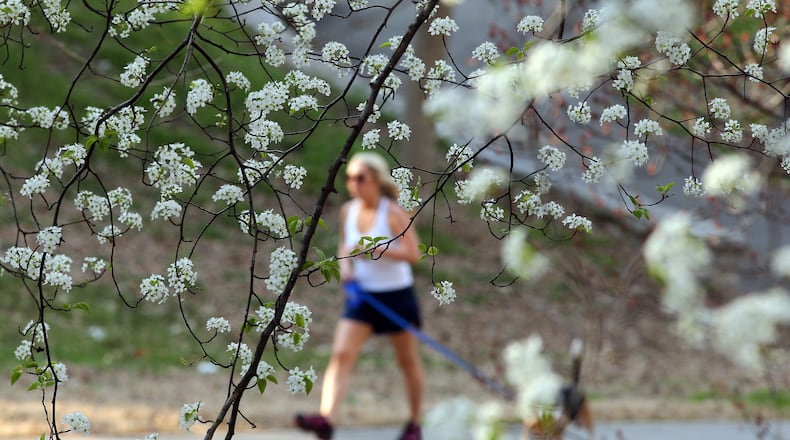Warm spring days in Atlanta can be lovely but the allergy season can make life miserable for those who suffer from seasonal allergies.
And at the moment, the pollen count for tree pollen in Atlanta has soared to “extremely high” levels, according to the latest measurements released Friday by the Atlanta Allergy & Asthma’s pollen counting station, which is certified by the National Allergy Bureau.
“We live in Atlanta which has a lot of trees and a lot of green areas which is great and has a lot of health benefits,” said Dr. Pedro Lamothe, an Emory Healthcare pulmonologist. “But these trees have a lot of pollen and that pollen can stay in the air for a certain period of time and create some congestion and irritation to people who are allergic to them.”
The Weather Channel’s 15-day allergy forecast predicts tree pollen will remain at this very high level for the next several days with the exception of a slight dip predicted to moderate levels on Tuesday.
Allergy seasons are coming earlier and lasting longer due to climate change, according to experts. Lamothe said whether we are at the peak of the season remains to be seen with a variety of factors including temperature, humidity and wind determining the intensity of the season and just how long it will last.
The yellow and green dust on your car and everywhere is a sign we are in the throes of pollen season in Georgia. But that’s likely not what’s causing your allergies go haywire.
Tree pollen is the most common trigger of spring allergies. But contrary to popular belief, flowering trees such as cherry trees are usually not the problem. It’s the hardwood trees, including oak, hickory and birch trees, and red cedar. They have light, powdery and often invisible pollen causing the most havoc. These hardwoods produce lightweight pollen which can be carried by the wind, sometimes over vast distances.
Symptoms from seasonal allergies can include severe headaches and brain fog, preventing people from enjoying spring-like temperatures outdoors and even sabotaging their sleep.
Dr. Lily Hwang of Atlanta Allergy & Asthma, a large allergy practice in Georgia started seeing a rise in patients suffering from seasonal allergies earlier this month.
She recommends those tormented by allergies regularly check daily pollen counts. Severe allergy sufferers should try to stay indoors on the windiest, driest days, because the pollen is usually higher than after a good rain, which helps clear pollen from the air. High pollen days, she said, are not the time to go for a run or do yardwork chores such as lawn mowing, weed pulling, and gardening — all of which can aggravate your pollen allergy.
If you’ve been outside a lot during the day, pollen is on your body and clothes. Upon arriving home, immediately take a shower and change clothes, she said.
Whenever pollen counts are high, make sure to keep your doors and windows closed, she also recommends. You can keep your indoor air clean by using high-efficiency air filters on air conditioners, using a dehumidifier, putting an air purifier called a high-efficiency particulate air (HEPA) filter near your bed, and cleaning your floors often.
Hwang said ideally allergy sufferers have already started taking medication at least two weeks ago because it’s best to start taking medication a couple weeks before your allergy symptoms typically arrive.
But the medications can also be taken as needed during the season. You’ll just have to be patient (and likely suffer a little longer) before they fully kick in.
Nasal steroid sprays are often the best first treatment option. They block inflammation and swelling caused by airborne irritants and allergens, and prevent allergy symptoms. Over-the-counter steroid nasal sprays include: Triamcinolone (sold under the brand name Nasacort); fluticasone (Flonase or Flonase Sensimist); and budesonide (Rhinocort).
Lamothe, who is also a professor at Emory School of Medicine, said there is no one-size-fits-all approach to coping with spring allergies. He said an important first step is determining what is the culprit.
He then recommends those who get hit hard by spring allergies have a plan in place — and be proactive — to keep seasonal allergies under control.
“Taking your allergy medications as scheduled and prescribed is very very important,” he said. “A lot of people only take medications when they have really bad symptoms and really these medications work better to prevent them than to get rid of them. So I start my allergy medications — my nasal spray, my antihistamines, my eye drops a few days in advance so by the time I am hit with those allergens, my body is already primed and prepared to receive them and is not going to respond exaggerated to that stimulus and then my symptoms are going to be much, much better controlled.”
Lamothe, who also has asthma, said being more proactive in recent years has helped him manage his allergies better. He describes his symptoms in the “moderate” range. Even so, he said on some spring days when the pollen count is high, he chooses to stay inside to avoid exacerbating his allergies — even when Atlanta is beautifully in bloom.
About the Author
Keep Reading
The Latest
Featured


